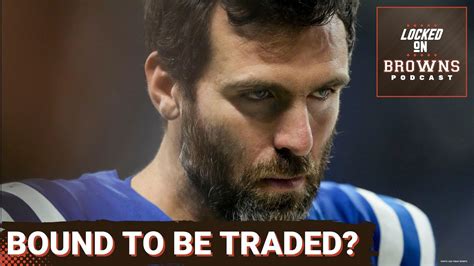
Cleveland Browns rookie quarterback Shedeur Sanders, while demonstrating potential, still needs experienced guidance, a need complicated by veteran quarterback Joe Flacco’s reluctance to embrace a mentoring role, especially concerning Sanders and Dillon Gabriel.
Despite signing with the Browns, Flacco has expressed reservations about actively mentoring the younger quarterbacks, stating that his primary focus is on his own performance and preparation. This situation underscores the Browns’ challenge in providing adequate support and mentorship for Sanders as he navigates his transition to the NFL. Flacco’s arrival was initially seen as a potential boon for the quarterback room, offering a seasoned presence. However, his recent comments have shifted the narrative, raising questions about the dynamic within the team and the developmental path for its young quarterbacks.
Joe Flacco’s response to inquiries about his role as a mentor to the Browns’ younger quarterbacks, including Shedeur Sanders and Dillon Gabriel, has stirred considerable debate. During a press conference, Flacco appeared to bristle at the suggestion that mentoring was a significant part of his responsibilities.
“I’m here to prove myself,” Flacco stated. “I’m here to compete and show that I can still play at a high level. Mentoring is secondary to my primary goal, which is to contribute to the team’s success on the field.”
This statement has led to discussions about the dynamics within the Browns’ quarterback room and the potential impact on the development of Sanders, a highly touted rookie prospect. The Browns’ organization had hoped that Flacco’s experience would serve as a valuable resource for the younger players. However, Flacco’s focus on his own performance has raised concerns about whether Sanders will receive the necessary guidance to accelerate his growth in the NFL.
The situation highlights a broader challenge in professional sports, where veterans are often expected to balance their competitive drive with a mentoring role. While some players embrace this dual responsibility, others, like Flacco, prioritize their own careers. This can create a complex dynamic within the team, particularly when it comes to developing young talent.
The Browns’ front office and coaching staff will need to carefully manage this situation to ensure that Sanders receives the support he needs. This may involve assigning other coaches or veteran players to provide mentorship, or finding alternative ways to facilitate Sanders’ development. The team’s success in nurturing young talent could be crucial to their long-term prospects in a competitive NFL landscape.
Impact on Shedeur Sanders
The lack of direct mentorship from Flacco places added pressure on Sanders to learn and adapt quickly. While Sanders possesses considerable talent, the NFL is a complex and challenging environment, and guidance from an experienced quarterback can be invaluable. Without Flacco’s active involvement, Sanders may need to rely more heavily on other resources, such as coaching staff, film study, and on-field experience.
Sanders’ development is particularly important for the Browns, given their investment in him as a potential franchise quarterback. The team will need to provide him with a supportive environment and the necessary tools to succeed, even in the absence of a dedicated mentor in Flacco. This could involve tailoring the offensive scheme to his strengths, providing him with ample opportunities to play in preseason games, and pairing him with a veteran quarterback coach who can offer personalized guidance.
The Browns’ coaching staff, led by head coach Kevin Stefanski and offensive coordinator Ken Dorsey, will play a critical role in Sanders’ development. They will need to closely monitor his progress, provide constructive feedback, and adjust their approach as needed. The team may also consider bringing in additional quarterback consultants or advisors to supplement the coaching staff’s expertise.
Flacco’s Perspective
Flacco’s reluctance to embrace a mentoring role is understandable, given his own career aspirations. At 39 years old, Flacco is in the twilight of his NFL career and is likely focused on maximizing his own performance and contributing to the team’s success on the field. He has a Super Bowl MVP on his resume, but is also striving to prove he still belongs.
“I believe that my primary responsibility is to be the best quarterback I can be,” Flacco explained. “I want to show that I can still compete at a high level and help this team win games. While I’m happy to answer questions and offer advice when asked, I don’t see myself as a dedicated mentor.”
Flacco’s perspective reflects a common sentiment among veteran players, who often prioritize their own careers over mentoring younger players. However, it also highlights the importance of clear communication and expectations within the team. The Browns’ front office and coaching staff need to ensure that Flacco understands the team’s goals for Sanders’ development and that they are aligned on how to achieve them.
Broader Implications
The situation in Cleveland raises broader questions about the role of veteran players in developing young talent. While some veterans embrace the mentoring role and see it as an important part of their legacy, others are more focused on their own performance. This can create challenges for teams that are trying to build for the future while also competing in the present.
Teams need to carefully consider the personalities and motivations of their veteran players when assigning mentoring responsibilities. They should also provide clear expectations and incentives for veterans to invest in the development of younger players. This could involve offering bonuses or other rewards for mentoring, or incorporating mentoring responsibilities into players’ contracts.
Ultimately, the success of any mentoring relationship depends on the willingness of both the mentor and the mentee to invest in the process. Sanders will need to be proactive in seeking guidance from Flacco and other experienced players, while Flacco will need to be open to sharing his knowledge and experience. The Browns’ coaching staff can facilitate this process by creating a supportive and collaborative environment within the team.
Browns’ Options and Strategies
Given Flacco’s stance, the Browns have several options to ensure Sanders receives adequate mentorship:
-
Leverage Other Veteran Players: The Browns roster likely includes other veteran players, particularly on the offensive side of the ball, who can provide guidance and support to Sanders. These players may be more willing to take on a mentoring role and can offer valuable insights into the nuances of the NFL game.
-
Enhance Coaching Staff Support: The coaching staff can play a more active role in Sanders’ development by providing him with personalized coaching, film study sessions, and on-field instruction. This may require the team to dedicate additional resources to the quarterback coaching position or to bring in outside consultants with expertise in quarterback development.
-
Create a Structured Mentoring Program: The Browns can establish a formal mentoring program that pairs Sanders with a designated mentor, either within the team or from outside the organization. This program can provide Sanders with a structured framework for learning and development, as well as access to experienced professionals who can offer guidance and support.
-
Focus on Film Study and Game Preparation: In the absence of direct mentorship from Flacco, Sanders can focus on studying film and preparing for games. This will allow him to learn from his mistakes and identify areas for improvement. The coaching staff can provide him with the resources and support he needs to effectively analyze film and develop game plans.
-
Promote a Collaborative Quarterback Room Environment: The Browns can foster a collaborative environment within the quarterback room, where all quarterbacks are encouraged to share their knowledge and experiences. This will allow Sanders to learn from his peers and develop a strong sense of camaraderie with his fellow quarterbacks.
The Drafting of Sanders and Team Strategy
The Browns’ decision to draft Shedeur Sanders reflects a long-term vision for the quarterback position. While the team currently has Deshaun Watson as the starting quarterback, Sanders represents a potential future franchise player. Drafting Sanders allows the Browns to develop a young quarterback under Watson, providing depth and competition at the position.
The Browns’ strategy in drafting Sanders is similar to that of other NFL teams that have drafted quarterbacks in recent years. Teams are increasingly willing to invest in young quarterbacks, even when they have an established starter, in order to secure their future at the position. This strategy allows teams to develop quarterbacks at their own pace, without the pressure of having to immediately start them.
The Importance of Mentorship in NFL
Mentorship is crucial for the development of young quarterbacks in the NFL. Experienced quarterbacks can provide guidance on everything from reading defenses to managing game situations. They can also offer advice on how to handle the pressures of playing in the NFL, both on and off the field.
Mentorship can help young quarterbacks develop the skills and knowledge they need to succeed in the NFL. It can also help them build confidence and develop a strong work ethic. The lack of mentorship can be a significant obstacle for young quarterbacks, potentially hindering their development and limiting their potential.
Fan and Media Reactions
Flacco’s comments have generated a mixed reaction from fans and media. Some have criticized him for being selfish and unwilling to help the team’s young quarterbacks. Others have defended him, arguing that he is entitled to focus on his own career and that it is not his responsibility to mentor younger players.
The media has also weighed in on the situation, with some outlets criticizing Flacco and others defending him. The debate highlights the complex dynamics within NFL teams and the challenges of balancing individual goals with team objectives.
Future Implications for the Browns
The situation with Flacco and Sanders has the potential to impact the Browns’ future in several ways:
-
Sanders’ Development: The lack of mentorship from Flacco could hinder Sanders’ development, potentially limiting his potential as a future franchise quarterback.
-
Team Chemistry: The situation could create tension within the quarterback room and disrupt team chemistry.
-
Public Perception: The Browns’ handling of the situation could impact their public perception and their ability to attract free agents and draft prospects in the future.
The Browns will need to carefully manage the situation to minimize any negative impact on the team. They will need to provide Sanders with the support he needs to develop, while also ensuring that Flacco remains engaged and motivated. The team’s success in navigating this challenge will be crucial to their long-term prospects.
Shedeur Sanders’ Background and Skill Set
Shedeur Sanders enters the NFL with significant pedigree and attention, largely due to his successful college career and the influence of his father, Deion Sanders. Sanders played college football initially at Jackson State, where his father was the head coach, before transferring to Colorado when Deion Sanders took over the head coaching role there.
During his time in college, Sanders demonstrated a strong arm, good accuracy, and the ability to make plays both inside and outside the pocket. He is known for his poise under pressure and his leadership qualities. However, like all rookie quarterbacks, he faces a steep learning curve in adapting to the speed and complexity of the NFL game.
Sanders’ strengths include:
-
Arm Strength: He possesses the arm strength to make all the throws required in the NFL, including deep passes and tight-window throws.
-
Accuracy: He is generally accurate with his throws, especially on short and intermediate routes.
-
Mobility: He is a capable runner and can extend plays with his legs, although he is not primarily a running quarterback.
-
Poise: He demonstrates poise and composure under pressure, which is a valuable asset for a quarterback.
Areas for improvement include:
-
Reading Defenses: He needs to improve his ability to read complex NFL defenses and make quick decisions.
-
Consistency: He needs to become more consistent with his accuracy, particularly on deep throws.
-
Decision-Making: He needs to refine his decision-making, especially in high-pressure situations.
The Browns’ Quarterback Situation Beyond 2024
The Browns’ quarterback situation beyond the 2024 season is somewhat uncertain. Deshaun Watson is currently the team’s starting quarterback, but his performance has been inconsistent since joining the Browns, and he has been hampered by injuries. The Browns have invested heavily in Watson, both in terms of trade capital and contract, but his future with the team is not guaranteed.
If Watson continues to struggle or suffers further injuries, Sanders could be in line to compete for the starting job in the future. The Browns’ development of Sanders will be crucial to their long-term success at the quarterback position.
Analyzing Kevin Stefanski’s Role
Head coach Kevin Stefanski’s role in developing quarterbacks is critical to the Browns’ future. Stefanski is known for his offensive acumen and his ability to tailor his schemes to the strengths of his quarterbacks. He has a track record of success in working with quarterbacks, and his ability to develop Sanders will be closely watched.
Stefanski will need to work closely with Sanders to refine his skills, improve his decision-making, and prepare him for the challenges of the NFL. He will also need to create an offensive scheme that allows Sanders to thrive, while also providing him with the support he needs to succeed.
The Browns’ Organizational Culture and Player Development
The Browns’ organizational culture plays a significant role in player development. The team has invested in building a strong coaching staff and a supportive environment for its players. The Browns’ front office is committed to providing its players with the resources they need to succeed, both on and off the field.
The Browns’ organizational culture is particularly important for young players like Sanders. The team needs to create an environment where Sanders feels comfortable asking questions, seeking guidance, and learning from his mistakes. The Browns’ coaching staff and veteran players need to be supportive and encouraging, providing Sanders with the confidence he needs to develop into a successful NFL quarterback.
FAQ Section:
1. What is the main issue with Joe Flacco’s presence on the Cleveland Browns? The main issue is that despite being a veteran quarterback, Flacco has expressed reluctance to take on a mentoring role with the younger quarterbacks on the team, particularly Shedeur Sanders and Dillon Gabriel. He is primarily focused on proving his own ability to still play at a high level.
2. How might Shedeur Sanders’ development be affected by Flacco’s stance? Sanders might miss out on valuable, direct mentorship from an experienced NFL quarterback. This could slow his learning process and adaptation to the NFL, requiring him to rely more on coaching staff, film study, and game experience.
3. What alternative strategies can the Browns employ to support Sanders’ development? The Browns can leverage other veteran players for mentorship, enhance coaching staff support, create a structured mentoring program, focus on film study and game preparation, and promote a collaborative quarterback room environment.
4. What is Flacco’s reasoning for not wanting to be a mentor? Flacco, at 39 years old, believes his primary responsibility is to compete and prove he can still play at a high level. He sees mentoring as secondary to his personal goals and contribution to the team’s success on the field.
5. What does this situation reveal about the dynamics between veteran and rookie players in the NFL? It highlights the tension that can exist between veteran players who are focused on their own careers and the expectation that they should mentor younger players. It underscores the need for clear communication and aligned expectations within teams regarding the roles of veteran players.
The Browns’ management now faces the intricate task of fostering a conducive environment where Sanders can flourish, even without direct mentorship from Flacco, and where the team’s quarterback room remains harmonious. This situation underscores the complexities of team dynamics and player development in the NFL.
![Bob’s Red Mill’s New [Product] Is a Family Favorite: Gone in Days!](https://infoduniaku.com/wp-content/uploads/2025/06/unnamed-file-279-150x150.jpg)








